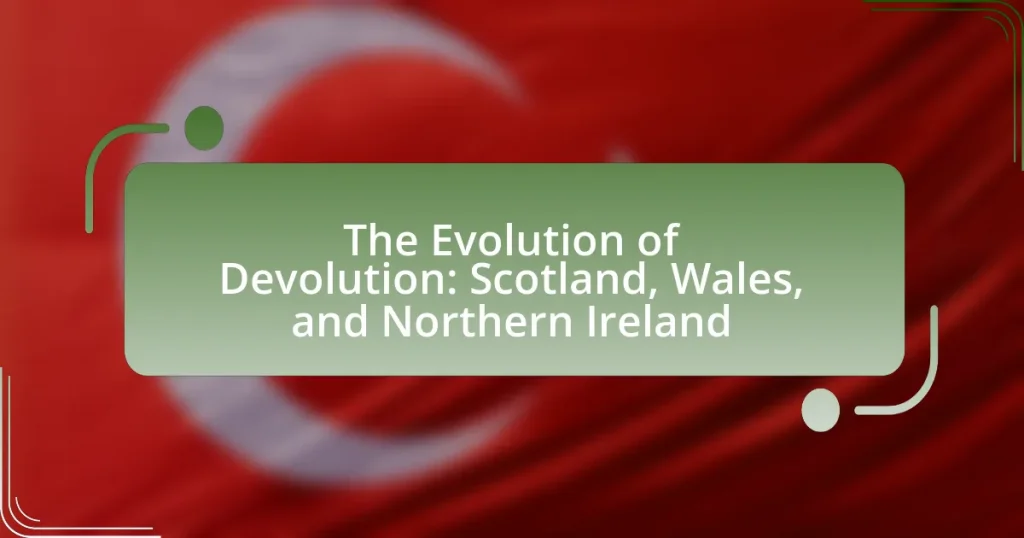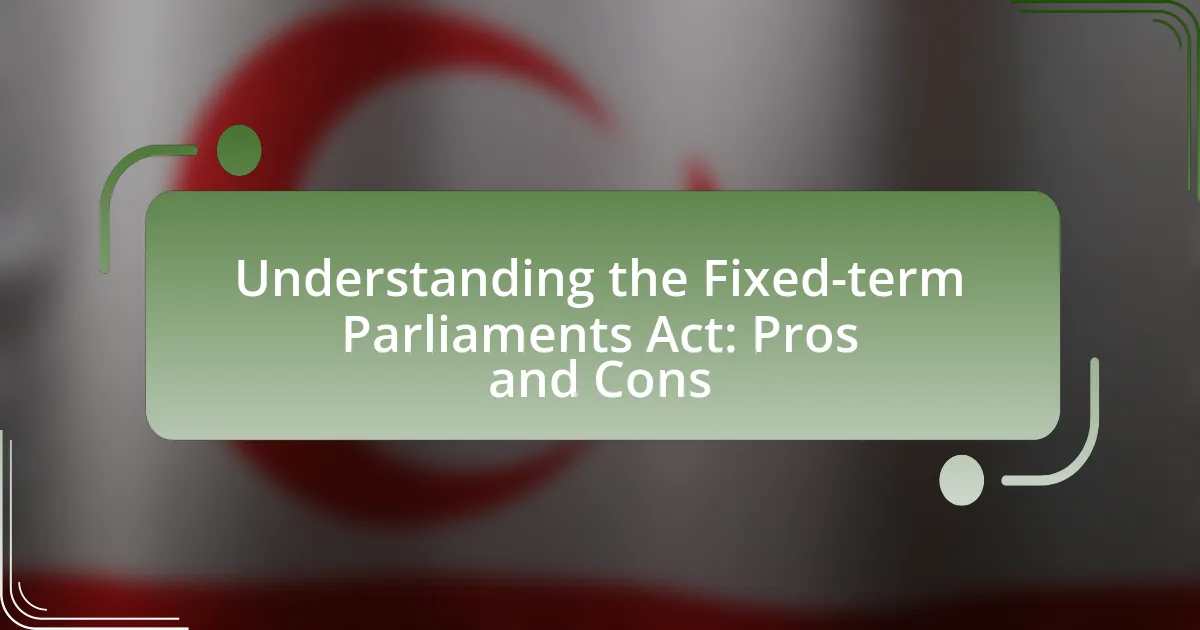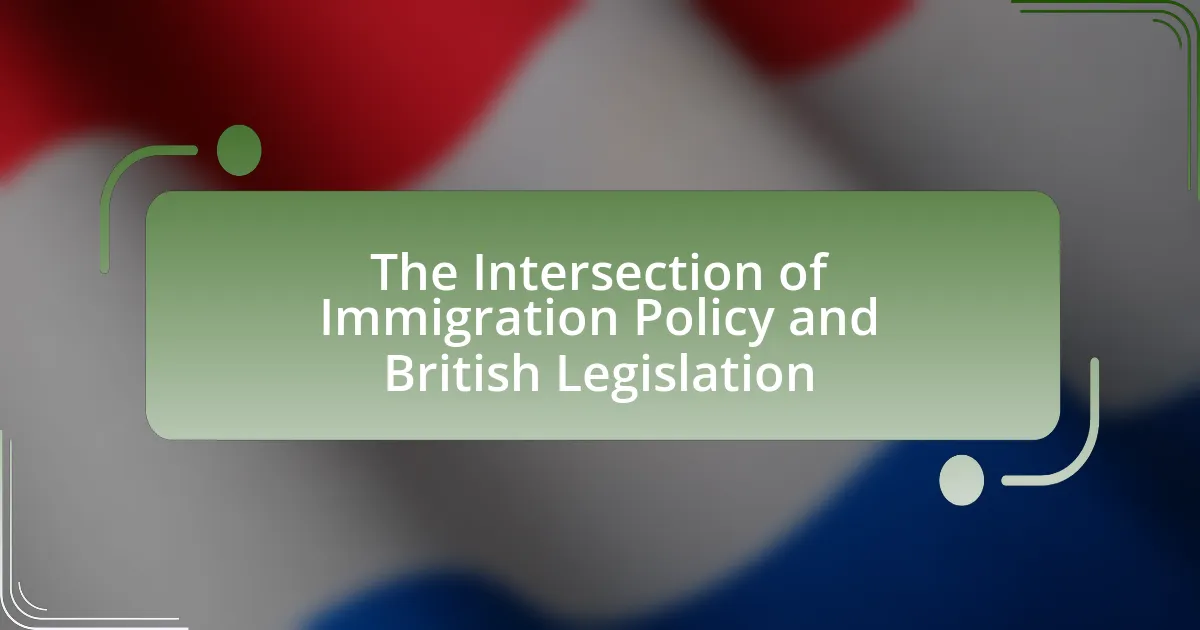The article focuses on the evolution of devolution in the United Kingdom, detailing the transfer of powers from the UK Parliament to the devolved administrations in Scotland, Wales, and Northern Ireland. It outlines the historical context that led to the establishment of the Scottish Parliament and the Welsh Assembly in 1999, as well as the Northern Ireland Assembly under the Good Friday Agreement. Key milestones, significant legislation, and the impact of public opinion and referendums on the devolution process are discussed, along with the challenges and political conflicts that have arisen. The article also examines the current functioning of devolved governments, the powers granted to each region, and the future of devolution in light of Brexit and ongoing calls for further autonomy.

What is the Evolution of Devolution in the UK?
The evolution of devolution in the UK refers to the process by which powers have been transferred from the UK Parliament to the devolved administrations in Scotland, Wales, and Northern Ireland. This process began in earnest with the establishment of the Scottish Parliament and the Welsh Assembly in 1999, following referendums in 1997 that demonstrated public support for devolution.
In Scotland, the Scotland Act 1998 created a parliament with significant legislative powers, including areas such as education, health, and justice. Wales initially received a more limited assembly with the Government of Wales Act 1998, which was later expanded by the Government of Wales Act 2006, granting it greater powers. Northern Ireland’s devolved government was established under the Good Friday Agreement in 1998, allowing for a power-sharing arrangement between different political parties.
Subsequent developments include the Scotland Act 2012 and 2016, which further increased the powers of the Scottish Parliament, and the Wales Act 2017, which provided Wales with a reserved powers model similar to that of Scotland. The devolution process has been marked by ongoing debates about the balance of power between the devolved administrations and the UK Parliament, particularly in light of Brexit, which has raised questions about the future of devolved powers and intergovernmental relations.
How did devolution begin in Scotland, Wales, and Northern Ireland?
Devolution in Scotland, Wales, and Northern Ireland began in the late 20th century as a response to growing demands for self-governance and regional identity. In Scotland, the process was initiated by the establishment of the Scottish Constitutional Convention in 1989, which led to the 1997 referendum where 74.3% of voters supported the creation of a Scottish Parliament. In Wales, devolution began with the 1997 referendum, where 50.3% of voters favored the establishment of the National Assembly for Wales. Northern Ireland’s devolution was formalized through the Good Friday Agreement in 1998, which established the Northern Ireland Assembly, following a referendum that garnered 71.1% support. These events marked significant milestones in the devolution process, reflecting the distinct political and cultural aspirations of each region.
What historical events led to the push for devolution?
The push for devolution in the United Kingdom was significantly influenced by historical events such as the rise of nationalism in Scotland and Wales, the establishment of the Scottish National Party in the 1930s, and the devolution referendums of 1979 and 1997. The 1979 referendum, which resulted in a narrow defeat for the devolution proposal, highlighted the growing demand for self-governance. The subsequent 1997 referendum, which led to the establishment of the Scottish Parliament and the Welsh Assembly, demonstrated a decisive shift in public sentiment towards devolution. Additionally, the Good Friday Agreement of 1998 played a crucial role in facilitating the devolution of powers to Northern Ireland, reflecting a broader trend towards regional autonomy within the UK. These events collectively underscored the desire for greater political representation and self-determination among the nations of the UK.
How did public opinion shape the devolution process?
Public opinion significantly influenced the devolution process in Scotland, Wales, and Northern Ireland by creating a demand for greater autonomy and self-governance. In Scotland, for instance, the 1997 referendum, where 74.3% voted in favor of a Scottish Parliament, demonstrated a strong public desire for devolution, leading to the establishment of the Scottish Parliament in 1999. Similarly, in Wales, the 1997 referendum resulted in a narrow approval for the creation of the National Assembly for Wales, reflecting public support for devolved governance. In Northern Ireland, public opinion was shaped by the peace process and the Good Friday Agreement of 1998, which was endorsed by a referendum with 71.1% approval, emphasizing the importance of public sentiment in legitimizing the devolved institutions. These examples illustrate how public opinion acted as a catalyst for the devolution process, driving political leaders to respond to the electorate’s aspirations for local governance.
What are the key milestones in the devolution journey?
The key milestones in the devolution journey include the establishment of the Scottish Parliament and the Welsh Assembly in 1999, which marked the beginning of significant legislative powers for Scotland and Wales. The Scotland Act 1998 created the framework for the Scottish Parliament, allowing it to legislate on various matters, while the Government of Wales Act 1998 set up the Welsh Assembly with limited powers initially. In 2014, the Scotland Act further enhanced the powers of the Scottish Parliament, granting it more control over taxation and welfare. Additionally, the Wales Act 2017 provided the Welsh Assembly with greater legislative powers and clarified its status. These milestones collectively represent the progressive shift towards self-governance in Scotland, Wales, and Northern Ireland, reflecting the evolving political landscape in the UK.
What significant legislation has been passed regarding devolution?
The significant legislation passed regarding devolution includes the Scotland Act 1998, the Government of Wales Act 1998, and the Northern Ireland Act 1998. The Scotland Act 1998 established the Scottish Parliament and granted it varying degrees of legislative power, marking a pivotal moment in Scotland’s governance. The Government of Wales Act 1998 created the National Assembly for Wales, allowing for devolved powers in areas such as health and education. The Northern Ireland Act 1998 restored the Northern Ireland Assembly, enabling self-governance after years of direct rule. These acts collectively represent the foundational legal framework for devolution in the UK, facilitating greater autonomy for Scotland, Wales, and Northern Ireland.
How have referendums influenced the devolution process?
Referendums have significantly influenced the devolution process by providing a democratic mandate for the establishment of devolved governments in Scotland, Wales, and Northern Ireland. The 1997 referendums in these regions resulted in overwhelming support for devolution, leading to the creation of the Scottish Parliament and the Welsh Assembly, as well as the Northern Ireland Assembly. Specifically, 74.3% of voters in Scotland and 50.3% in Wales voted in favor of devolution, demonstrating a clear public desire for self-governance. These referendums not only legitimized the devolution process but also set a precedent for future governance structures, shaping the political landscape of the United Kingdom.
What challenges have arisen during the evolution of devolution?
The challenges that have arisen during the evolution of devolution include political tensions, economic disparities, and issues of governance. Political tensions often manifest in disagreements between devolved governments and the UK Parliament, as seen in the disputes over powers and funding allocations. Economic disparities are highlighted by the varying levels of financial resources available to different regions, which can lead to inequalities in public services. Additionally, governance issues arise from the complexity of managing multiple layers of government, which can create confusion and inefficiencies in policy implementation. These challenges have been documented in various reports, including the “Devolution and Democracy in the UK” report by the Institute for Government, which outlines the impact of these issues on the effectiveness of devolved administrations.
What political conflicts have impacted the devolution process?
Political conflicts that have impacted the devolution process include the tensions between the UK government and regional governments, particularly in Scotland and Wales, over issues of autonomy and resource allocation. For instance, the Scottish independence referendum in 2014 highlighted deep divisions regarding Scotland’s political future and its relationship with Westminster, leading to increased calls for further devolution. Additionally, the Wales Act 2017 was influenced by political disputes over the extent of powers granted to the Welsh Assembly, reflecting ongoing debates about governance and representation. These conflicts demonstrate how political dynamics shape the devolution landscape in the UK.
How have economic factors influenced devolution in the regions?
Economic factors have significantly influenced devolution in the regions by driving demands for greater autonomy and control over local resources. For instance, the economic disparities between regions, particularly in terms of wealth generation and public spending, have led to calls for devolved powers to address local needs more effectively. In Scotland, the discovery of North Sea oil in the 1970s heightened the argument for self-governance, as it provided a substantial revenue source that could be managed independently. Similarly, Wales has sought devolution partly due to economic challenges, such as the decline of traditional industries, prompting a desire for tailored economic strategies that reflect regional priorities. The establishment of the Welsh Assembly in 1999 and the Scottish Parliament in 1999 were direct responses to these economic pressures, allowing for localized decision-making that aims to enhance economic development and address regional inequalities.

How does devolution function in Scotland, Wales, and Northern Ireland?
Devolution in Scotland, Wales, and Northern Ireland functions through the establishment of separate legislative bodies that have varying degrees of power to govern specific areas. In Scotland, the Scottish Parliament was created in 1999, granting it authority over areas such as education, health, and justice, while the UK Parliament retains powers over reserved matters like defense and foreign affairs. Wales has the Senedd (Welsh Parliament), which gained legislative powers in 2011, allowing it to make decisions on areas including health and education, although some powers remain reserved to the UK Parliament. Northern Ireland operates through the Northern Ireland Assembly, established in 1998, which has devolved powers over areas such as health and education, but its operation has been subject to political agreements and suspensions. The devolution process in all three regions is underpinned by the Government of Wales Act 1998, the Scotland Act 1998, and the Northern Ireland Act 1998, which outline the powers and responsibilities of each devolved government.
What powers have been devolved to each region?
Scotland, Wales, and Northern Ireland have each received distinct devolved powers. Scotland has control over areas such as education, health, environment, and justice, as established by the Scotland Act 1998 and subsequent amendments. Wales has powers over health, education, and local government, granted through the Government of Wales Act 1998 and the Wales Act 2017. Northern Ireland has devolved authority over health, education, and justice, as outlined in the Northern Ireland Act 1998. These devolved powers allow each region to tailor policies and legislation to their specific needs and circumstances.
What legislative powers does the Scottish Parliament hold?
The Scottish Parliament holds legislative powers over a range of areas including health, education, justice, transport, and environment. Established by the Scotland Act 1998, it has the authority to create laws in these devolved areas, which are distinct from reserved matters that remain under the control of the UK Parliament. The devolution settlement has been further enhanced by subsequent legislation, such as the Scotland Act 2012 and the Scotland Act 2016, which expanded the Parliament’s powers, allowing it to set income tax rates and borrow money for capital projects.
How do the powers of the Welsh Senedd compare to those of Scotland?
The powers of the Welsh Senedd are more limited compared to those of the Scottish Parliament. The Welsh Senedd has devolved powers primarily in areas such as health, education, and local government, but it does not have full control over taxation or significant areas of law-making, which are reserved for the UK Parliament. In contrast, the Scottish Parliament has extensive powers, including the ability to legislate on a wider range of issues and to vary income tax rates. This difference is rooted in the Government of Wales Act 2006, which established the Senedd’s powers, and the Scotland Act 1998, which granted the Scottish Parliament greater autonomy.
What unique powers does the Northern Ireland Assembly possess?
The Northern Ireland Assembly possesses unique powers primarily in areas such as health, education, and justice, which are devolved from the UK Parliament. These powers allow the Assembly to legislate and make decisions on local matters, reflecting the specific needs and preferences of Northern Ireland’s population. For instance, the Assembly has the authority to set its own budget and allocate funding for public services, a power that was established under the Northern Ireland Act 1998. Additionally, the Assembly can create laws on various issues, including social policy and economic development, which are tailored to the region’s circumstances.
How do the devolved governments operate?
Devolved governments operate by exercising powers granted to them by the central government, allowing them to make decisions on specific local matters. In the United Kingdom, Scotland, Wales, and Northern Ireland have their own parliaments or assemblies, which are responsible for areas such as education, health, and transportation. These devolved bodies have the authority to legislate, allocate budgets, and implement policies tailored to their regions, reflecting the unique needs and preferences of their populations. For instance, the Scotland Act 1998 established the Scottish Parliament, granting it significant legislative powers, while the Government of Wales Act 1998 created the National Assembly for Wales, which has evolved to possess similar competencies.
What is the structure of the Scottish Government?
The structure of the Scottish Government consists of the Scottish Parliament and the Scottish Executive. The Scottish Parliament, located in Edinburgh, is a unicameral legislature responsible for making laws on devolved matters such as health, education, and justice. The Scottish Executive, led by the First Minister, is the administrative branch that implements these laws and manages public services. The Parliament has 129 Members of the Scottish Parliament (MSPs) elected through a mixed-member proportional representation system, ensuring both constituency and regional representation. This structure was established by the Scotland Act 1998, which marked a significant step in the devolution of powers from the UK Parliament to Scotland.
How does the Welsh Government function in practice?
The Welsh Government functions in practice through a devolved parliamentary system that allows it to make decisions on various policy areas, including health, education, and local government. Established by the Government of Wales Act 1998, the Welsh Government operates with powers granted by the UK Parliament, which can be expanded through subsequent legislation, such as the Government of Wales Act 2006. The Welsh Government is led by the First Minister and consists of various ministers responsible for specific portfolios, enabling it to implement policies tailored to the needs of Wales. The effectiveness of this system is evidenced by the establishment of the Senedd (Welsh Parliament), which provides a platform for democratic representation and legislative processes, allowing for direct public engagement in governance.
What are the operational challenges faced by the Northern Ireland Executive?
The Northern Ireland Executive faces several operational challenges, including political instability, budget constraints, and the impact of Brexit. Political instability arises from the complex power-sharing arrangement between unionists and nationalists, which can lead to deadlock and hinder decision-making. Budget constraints are significant, as the Executive often operates with limited financial resources, complicating the implementation of policies and services. Additionally, the impact of Brexit has introduced uncertainties regarding trade, immigration, and regulatory alignment, further complicating the Executive’s operational landscape. These challenges collectively impede effective governance and service delivery in Northern Ireland.

What is the future of devolution in the UK?
The future of devolution in the UK is likely to involve increased autonomy for Scotland, Wales, and Northern Ireland, driven by ongoing political pressures and public sentiment for self-governance. Recent trends indicate that regional governments are seeking greater powers, as evidenced by the Scottish Government’s push for a second independence referendum and the Welsh Government’s calls for more legislative authority. Additionally, the Northern Ireland Assembly’s functioning remains contingent on political stability, which influences its capacity to govern effectively. These developments suggest that devolution will continue to evolve, reflecting the distinct identities and aspirations of each nation within the UK.
How might devolution evolve in response to current political trends?
Devolution may evolve towards increased autonomy and legislative powers for regions like Scotland, Wales, and Northern Ireland in response to rising nationalist sentiments and demands for self-governance. Recent political trends, such as the Brexit referendum, have intensified calls for greater regional control, as evidenced by Scotland’s push for a second independence referendum and Wales advocating for more powers. The 2019 general election results, which showed a significant increase in support for nationalist parties, further indicate a shift towards prioritizing regional interests over centralized governance. This trend suggests that devolution could expand, leading to more distinct legislative frameworks tailored to the unique needs of each region.
What role does Brexit play in the future of devolution?
Brexit significantly impacts the future of devolution by altering the powers and responsibilities of devolved governments in Scotland, Wales, and Northern Ireland. The departure from the European Union has led to the repatriation of certain powers to the UK Parliament, which could undermine the legislative autonomy of these devolved administrations. For instance, areas such as agriculture and fisheries, previously governed by EU regulations, are now subject to UK-wide frameworks that may limit the ability of devolved governments to legislate independently. This shift has raised concerns about the potential centralization of power in Westminster, challenging the principles of devolution established by the Scotland Act 1998 and the Government of Wales Act 1998. Additionally, the divergence in policy approaches between the UK government and devolved administrations post-Brexit could exacerbate tensions, as seen in the disagreements over the Internal Market Act 2020, which some devolved leaders argue undermines their authority.
How are calls for further devolution or independence shaping the future?
Calls for further devolution or independence are significantly shaping the future of governance in Scotland, Wales, and Northern Ireland by increasing demands for self-determination and local autonomy. These movements are driven by a desire for greater control over political, economic, and social policies, reflecting a growing sentiment among populations that local governments can better address their unique needs. For instance, the Scottish National Party’s push for a second independence referendum highlights a strong public interest in determining Scotland’s future, evidenced by polling data showing that a substantial portion of the Scottish electorate supports independence. Additionally, the Welsh Government’s calls for enhanced powers demonstrate a similar trend, as Wales seeks to expand its legislative capabilities to respond more effectively to local issues. This evolving landscape indicates that as these calls gain momentum, they are likely to lead to more significant political changes, including potential constitutional reforms and shifts in the relationship between the devolved administrations and the UK Parliament.
What lessons can be learned from the evolution of devolution?
The evolution of devolution teaches that local governance can enhance political engagement and accountability. Historical examples from Scotland, Wales, and Northern Ireland demonstrate that devolved administrations often respond more effectively to regional needs than a centralized government. For instance, the establishment of the Scottish Parliament in 1999 led to increased voter participation and tailored policies addressing local issues, such as education and health care. Additionally, the varying degrees of devolution highlight the importance of flexibility in governance structures, allowing regions to adapt to their unique political and cultural contexts. This adaptability has been crucial in managing diverse interests and fostering a sense of national identity within the United Kingdom.
What best practices can be identified from the devolution experiences of Scotland, Wales, and Northern Ireland?
Best practices identified from the devolution experiences of Scotland, Wales, and Northern Ireland include the establishment of clear legislative powers, the promotion of public engagement in governance, and the development of intergovernmental relations. Clear legislative powers, as seen in Scotland’s Parliament, allow for tailored policies that address local needs, enhancing accountability and responsiveness. Public engagement is exemplified by Wales’ use of citizen assemblies to involve communities in decision-making processes, fostering trust and transparency. Additionally, effective intergovernmental relations, demonstrated by the Joint Ministerial Committee in the UK, facilitate collaboration and conflict resolution among devolved administrations, ensuring cohesive governance across regions. These practices contribute to more effective and representative governance in devolved contexts.
How can future devolution efforts be improved based on past experiences?
Future devolution efforts can be improved by incorporating lessons learned from previous devolution processes in Scotland, Wales, and Northern Ireland. For instance, the establishment of clear frameworks for accountability and transparency has proven essential; the Scotland Act 1998, which created the Scottish Parliament, emphasized these principles, leading to greater public trust and engagement. Additionally, ensuring adequate financial resources and fiscal autonomy, as seen in the Welsh Government’s increased funding following the Holtham Commission recommendations, can empower devolved administrations to make more impactful decisions. Furthermore, fostering intergovernmental relations and collaboration, as demonstrated by the Joint Ministerial Committee, can enhance policy coherence and address cross-border issues effectively. These improvements, grounded in historical precedents, can lead to more successful and sustainable devolution efforts in the future.
What practical steps can citizens take to engage with the devolution process?
Citizens can engage with the devolution process by participating in local government meetings, voting in elections for devolved parliaments, and joining community organizations that advocate for regional issues. Attending local council sessions allows citizens to voice their opinions and influence decision-making directly. Voting in elections for the Scottish Parliament, Welsh Senedd, or Northern Ireland Assembly ensures that representatives who align with their views are elected. Additionally, involvement in community organizations can amplify citizens’ voices on specific issues, fostering greater awareness and participation in the devolution process. These actions contribute to a more responsive and accountable governance structure in Scotland, Wales, and Northern Ireland.



